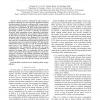Free Online Productivity Tools
i2Speak
i2Symbol
i2OCR
iTex2Img
iWeb2Print
iWeb2Shot
i2Type
iPdf2Split
iPdf2Merge
i2Bopomofo
i2Arabic
i2Style
i2Image
i2PDF
iLatex2Rtf
Sci2ools
PERCOM
2010
ACM
2010
ACM
Negotiate power and performance in the reality of RFID systems
—Recent years have witnessed the wide adoption of the RFID technology in many important application domains including logistics, inventory, retailing, public transportation, and security. Though RFID tags (transponders) can be passive, the high power consumption of RFID readers (interrogators) has become a critical issue as handheld and mobile readers are increasingly available in pervasive computing environments. Moreover, high transmission power aggravates interference, complicating the deployment and operation of RFID systems. In this paper, we present an energy-efficient RFID inventory algorithm called Automatic Power Stepping (APS). The design of APS is based on extensive empirical study on passive tags, and takes into consideration several important details such as tag response states and variable slot lengths. APS dynamically estimates the number of tags to be read, incrementally adjusts power level to use sufficient but not excessive power for communication, and consequentl...
Computer Networks | PERCOM 2010 | RFID | RFID Readers | RFID Tags |
| Added | 16 Aug 2010 |
| Updated | 16 Aug 2010 |
| Type | Conference |
| Year | 2010 |
| Where | PERCOM |
| Authors | Xunteng Xu, Lin Gu, Jianping Wang, Guoliang Xing |
Comments (0)

